| Rye %: | 90% |
| Stages: | Sponge, Final Dough (2 bulk fermentations, proof) |
| Leaven: | Rye sour culture, Instant yeast |
| Start to Finish: | 23-24 hours |
| Hands-on Time: | 45-50 minutes |
| Yield: | Two 2¾ lb/1.25 kg loaves |
Rye and apples – what could be better for an autumn bread – but in a wooden frame?
I first learned about baking in wood from Norm Berg, my co-author on Inside the Jewish Bakery. The old-school bakers, he told me, used to bake sponge cakes, wonder cakes and other cakes that were sold by the pound in wood in order to form the thinnest possible side crust. Most customers only wanted to buy soft inside pieces and the wooden frame kept waste to a minimum.
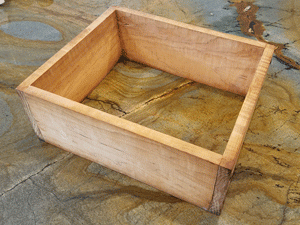 I next came across baking in wood in a German blog – I forget which one now – but I was fascinated that the practice was still alive and well. The blog, which was in German, helpfully gave me the German translation – Backrahmen (literally, “baking frame”).
I next came across baking in wood in a German blog – I forget which one now – but I was fascinated that the practice was still alive and well. The blog, which was in German, helpfully gave me the German translation – Backrahmen (literally, “baking frame”).
Several Google searches later, I had enough information not only to bake in one, but also to build my own, which I did using ½” thick clear maple from my local hardwoods dealer. Internally, it measures 10 inches x 8½ inches x 4 inches deep. I also cut another piece that I can use as a removable divider, so that I can bake either two loaves, as in this recipe, or four side-by-side loaves, without benefit of divider.
There are a few classic German and Austrian ryes – notably Paderborner Landbrot – that typically bake in a frame, whether for aesthetic or practical reasons, I’m not sure. However, when I came across this recipe in Dietmar Kappl’s wonderful blog, Home Baking, I couldn’t resist.
Not surprisingly, the top and bottom crusts are thick and chewy, while the side crusts are soft. The double bulk ferment – first with sour culture alone, the second with an instant yeast booser, produce a tender, open crumb and a clean, edgy sour flavor profile that carries with it hints of the grated apple and the subtle sting of the bread spice. This is a great table bread that goes equally well with sweet and savory foods.
Sponge (Day 1, Evening):
| Ingredient |
Grams |
Ounces |
Baker’s |
| Wholegrain rye flour |
600 |
21.15 |
100% |
| Warm (105°F/41°C) water |
600 |
21.15 |
100% |
| Rye sour |
30 |
1.05 |
5% |
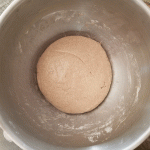 In the mixer bowl, combine the sponge ingredients by hand into a stiff dough, cover and ferment at room temperature (70°F/21°C) for 18 hours.
In the mixer bowl, combine the sponge ingredients by hand into a stiff dough, cover and ferment at room temperature (70°F/21°C) for 18 hours.
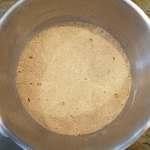 The sponge will show broken bubbles on the surface, have more than tripled in volume and begun to fall back on itself.
The sponge will show broken bubbles on the surface, have more than tripled in volume and begun to fall back on itself.
Final Dough – Bulk Ferment 1 (Day 2, Midday):
| Ingredient |
Grams |
Ounces |
| Sponge |
1,230 |
43.35 |
| Wholegrain rye flour |
750 |
26.45 |
| Whole wheat flour |
150 |
5.30 |
| Warm (105°F/41°C) water |
600 |
21.15 |
| Apple, peeled and grated |
120 |
4.25 |
| Salt |
30 |
1.05 |
| Bread spice |
8 |
0.25 |
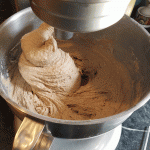 Add the final dough ingredients to the sponge and use the dough hook at low (KA2) speed to mix for 20 minutes. The dough will gather around the hook and show threads of gluten formation.
Add the final dough ingredients to the sponge and use the dough hook at low (KA2) speed to mix for 20 minutes. The dough will gather around the hook and show threads of gluten formation.
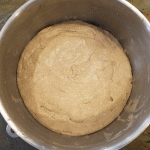 Cover and ferment at room temperature for 30 minutes. The dough will show slight expansion and small broken bubbles on the surface.
Cover and ferment at room temperature for 30 minutes. The dough will show slight expansion and small broken bubbles on the surface.
Final Dough – Bulk Ferment 2 (Day 2, Midday):
| Ingredient |
Grams |
Ounces |
| Final dough |
2,888 |
101.80 |
| Instant yeast, 1 tsp |
3 |
0.10 |
| Warm (105°F/41°C) water, 2 Tbs. |
30 |
1.05 |
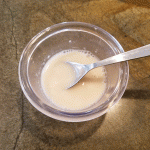 As soon as the final dough has finished mixing, combine the yeast and water and set aside for 30 minutes at room temperature to fully dissolve the yeast.
As soon as the final dough has finished mixing, combine the yeast and water and set aside for 30 minutes at room temperature to fully dissolve the yeast.
Add the yeast water to the dough and use the dough hook at low (KA2) speed to mix until the dough is evenly blended, 6-7 minutes. Cover and ferment at room temperature 30 minutes. The dough will have visibly expanded and show small broken bubbles on the surface.
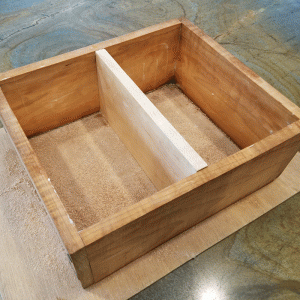 Turn the dough, which will be soft and very sticky, onto a well-floured work surface. Use floured hands to divide the dough into two pieces, each weighing approximately 3 lb/1.40 kg. Shape each into a cylinder. Grease the baking frame generously and place it on a parchment-lined sheet pan or well-floured peel.
Turn the dough, which will be soft and very sticky, onto a well-floured work surface. Use floured hands to divide the dough into two pieces, each weighing approximately 3 lb/1.40 kg. Shape each into a cylinder. Grease the baking frame generously and place it on a parchment-lined sheet pan or well-floured peel.
Set each of the dough pieces, seam side down, into its own compartment.
Cover and proof at room temperature until doubled in volume, 45-60 minutes.
Preheat the oven to 480°F/250°C with the baking surface in the middle and a steam pan on a lower shelf. Bake the loaves with steam for 3 minutes, then continue baking at 480°F/250°C for another 12 minutes. Reduce the temperature to 375°F/190°C and bake until the internal temperature is at least 198°F/92°C, about 60 minutes. Let the loaves cool in the frame for 5-10 minutes, then transfer to a rack and cool thoroughly before slicing.
Baker’s Percentages:
| Ingredient |
g |
% |
| TOTAL FLOUR |
1,500 |
100.00% |
| Wholegrain rye flour |
1,350 |
90.00% |
| Whole wheat flour |
150 |
10.00% |
| Water |
1,230 |
82.00% |
| Salt |
30 |
2.00% |
| Instant yeast |
3 |
0.20% |
| Rye sour culture |
30 |
2.00% |
| Apple |
120 |
8.00% |
| Bread spice |
8 |
0.50% |
| TOTAL FORMULA |
2,921 |
194.70% |
| Flour prefermented |
600 |
40.00% |


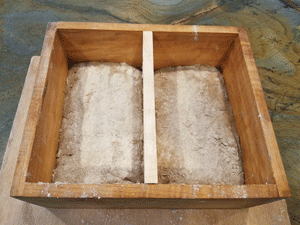
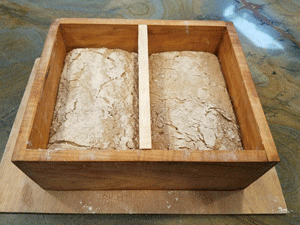

Keith Kornelis
November 23, 2017Bread spice?
Stanley Ginsberg
November 23, 2017Caraway, anise, fennel, coriander in the proportion of 10-4-4-2
LT
November 23, 2017As seeds or ground into powder?
MIke
November 23, 2017Whole spices or ground?
Keith
November 23, 2017Ok, thanks, thats great. Whole or ground?
Stanley Ginsberg
November 23, 2017ground
Ian Sandman
November 23, 2017Wow! This looks fantastic and I love the frame method. Thanks for sharing this.
Regards,
Ian
Sabine FriedrichWalter
November 23, 2017Stanley, The Ketex Baker in Germany baked in wooden frame bread.
Roxana
November 25, 2017Looks great! Did you take a photo of the crumb?
Stanley Ginsberg
November 29, 2017No, I didn’t, but it’s pretty open.
Steve
November 27, 2017It will be a while before I get a wood frame, but i want to make this bread right away. Any suggestion about whether to use regular bread pans, or clay bakers, or even my Pullman Pans without the lids (I’ve done this before with a 100% Rye/Orange/Caraway bread)?
Dana
November 27, 2017Is the best surface for below the open frame Metal? Or wood? Do you recommend parchment paper between the bottom of the loaf and the cooking surface?
Stanley Ginsberg
November 29, 2017I generally just slide it onto my baking stone. If you don’t have a stone, use a parchment-lined sheet pan.
Mark Woodward
November 29, 2017Stan, is that 3g or 8g of instant yeast? Given that google tells me that 1 tsp of instant yeast is 3g, I presume the 8g under preferment 2 is the typo, but I would like to confirm. Thanks. : )
Stanley Ginsberg
December 4, 2017My mistake. It’s 3 grams. Musta been a typo. Fixed now. Thanks for the heads-up.
Bob Niemi
December 4, 2017Thanks for the information on the wooden box — is there any other preparation the wood requires prior to baking — I.E., does it need to be oiled with canola oil or another food grade oil so is doesn’t dry out and crack. The apple rye looks like a great bread.
Stanley Ginsberg
December 4, 2017I coat the inside with vegetable shortening; I’ve seen recipes that call for oil. Other than that, nothing.
Mark Woodward
December 5, 2017The websites I found in German (using the translate feature in Chrome) call for coating the frame in rapeseed (canola) oil and baking it at 400°F before using it the first time.
Stanley Ginsberg
December 5, 2017Then by all means do that. I think I may have done that as well: frankly, I’ve had the frame for a couple of years and don’t remember how I treated it initially, but that sounds right.
Mark Woodward
December 13, 2017I thought I’d report on my somewhat mixed experience with this delicious bread.
First of all, I wanted to make a frame. Looking on the web I found that I needed a cedar or beech board 9cm x 2cm, which is pretty close to 3.5″ x 3/4″; in other words, a standard 1″x4″ works fine. I needed 3 pieces 31cm long, 3 x 25cm, and 2 x 12cm (but these latter two should be cut to fit, not to length). I found a 6′ cedar 1″x4″ at my local store for $8. This made a frame with one screwed in cross piece (as in the pictures here) plus two small removable pieces to be able to make 4 quadrants in the frame. I rubbed these with vegetable oil and baked them in the oven at 400F for one hour.
Then, on to the bread. I grind my own flour. In this case I found that the dough was far too hydrated to shape (something that often, but not consistently, happens with the recipes here). I suppose this has to do with the rye and wheat berries that I am milling. So I just plopped the dough into the frame, which I had resting on a sheet of parchment paper on a peel. When the bread was fully baked I removed it from the oven and let it rest 10 minutes as called for in the recipe. And then I ran into problems. Not only had the dough stuck to the frame but moisture had run out the bottom creating a hard thin crust all along the bottom surface of the frame. I had to cut the loaves out of the frame, after which they appeared to slump a bit. So this was not one of my more successful bakes. I presume this was because the dough was too wet.
Nonetheless, the bread tastes fabulous. Indeed, my wife, who generally never likes rye bread, announced with a smile and surprise that she loves this. The crumb is relatively soft and open and the flavor is exceptional. I will definitely do this again but will significantly reduce the hydration. : )
Steve
December 13, 2017I had the same problem with the hydration and my first attempt I couldn’t do anything other than add more flour and pour/spoon the batter (it was more like a batter than a dough) into Pullman pans. It was delicious and the next time I just added more flour until I could shape something. I’m not sure if I got what’s intended but everyone who had this bread, which I made into cheddar and apple butter sandwiches, loved it.
Kiki
January 4, 2018Did you use the 3lb pullman, 13×4? And two of them? Thanks. The box, as lovely as it is, seems like a little bit of a project, and I’m anxious to try this recipe.
Steve
January 4, 2018Yes, I did use the 13 x 4 pans. I love this bread now have made it several times. But it’s never quite what the recipe describes. Delicious though!
Kiki
January 4, 2018Thank you for your help. Bread bakers are the best!
Karin Anderson
December 13, 2017The bread sounds and looks very nice! What kind of apple did you use?
A wooden baking frame is high on my wish list, and I would have ordered one from Ketex if this was an item easily fitting in a carry-on.
I’ll tell my husband that other guys are resourceful enough to build one 🙂
Tortoise
January 14, 2018Hi Stan,
I made this formula this past weekend and I noticed that when following your directions for scaling you say to divide the dough in two giving approximately 960g per loaf but I got around 1400g per loaf. I just soldiered on and baked them in two large pullman shaped loaf tins (1.8 litre Vardagen anodized loaf pans from IKEA) since I don’t have a bread frame. I’m just wondering if this is a typo since the total dough weight is almost 3 kg. Can you please clarify?
Thanks,
Tortoise
Stanley Ginsberg
January 14, 2018You’re correct; that was my error and has been corrected. Thanks!
Jonathan Mandel
June 1, 2018I made this with organic rye I milled myself. I cut the formula in half, intending to bake one loaf in a loaf pan, but of course the wood frame is bigger than my loaf pan. So even cutting the recipe in half, I had enough dough for 2 loaves. For the initial sponge, I used 250g water. But I ended up adding that 50g back into the final dough, as it was quite stiff.
Robert Blomberg
July 12, 2018I was wondering if a bread frame made in the size of a Pullman pan would work for loafs that call for Pullman pans or are the sides too thick to heat properly? This bread looks really good I will have to make the frame and try to make the bread.
Stanley Ginsberg
July 15, 2018No problem at all using that size frame. Just remember that the thicker walls require longer bake time. Use a thermometer to check loaf temp.
FC daisy
November 27, 2018This week I tried the Normandy Cider Rye from your Rye Baker book using fresh ground homegrown rye and home brewed cider. It is the most delicious bread. I wonder if grated apple could be added to it, to accentuate the sweetness and apple flavor? Even though our cider was dry, the bread has a delicate sweetness, must be from the rye. So many rye bread recipes to try!
maggie
June 14, 2019hello!!!
mine came out soon good and super moist but didn’t taste the apples at all and i wish i can, is there any tips for that? did yours taste like apples?
thank you
Sarah
September 3, 2019I would try adding dried apples pieces diced small. You’d have the fruit retain its shape and the concentrated flavor of the apple as well.
WGB
February 10, 2020Excited to try this, is there a way to make this with sourdough only?
Stanley Ginsberg
February 13, 2020Yes, if you pre-ferment at least 35% of the total flour in an initial sponge.
Pingback: Wholegrain Apple Rye – Grey Street Bakery